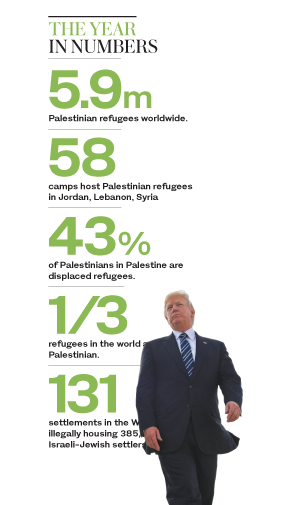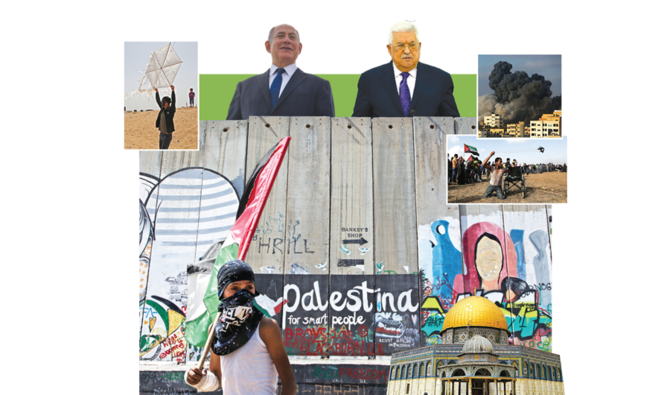AMMAN: For many Palestinians living under occupation, 2018 was a terrible year. The US moved its embassy in Israel from Tel Aviv to Jerusalem, and cut funding to the UN agency for Palestinian refugees.
Violent Israeli repression included the killing of more than 200 unarmed Palestinian protestors in Gaza.
Former Palestinian Prime Minister Salam Fayyad described 2018 as “a bad year” for his people and their national cause.
Fayyad, now a professor at Princeton University’s Woodrow Wilson School of Public and International Affairs, told Arab News: “There’s nothing on the horizon to suggest that next year will be any better.”
He called for “a national empowerment agenda anchored on the unification of the Palestinian polity.”
Ziad Khalil Abu Zayyad, spokesman on international affairs for the Palestinian faction Fatah, told Arab News that 2018 “was a very difficult year because of the ongoing Israeli crimes against the Palestinian population under occupation, and US policies targeting refugees and Jerusalem.”

Mohammad Zahaika, a political analyst in Jerusalem, told Arab News: “There’s a feeling that things will worsen due in part to Israel’s extreme position, which will most likely reject even a pro-Israel deal (from the US) because the Israelis aren’t willing to give up a single inch of the Palestinian territories occupied in 1967.”
But “history has shown that the strong won’t stay strong forever, nor will the weak be weak forever,” he added.
US President Donald Trump, who in December 2106 said the embassy move would not affect the outcome of negotiations, later boasted that he singlehandedly “took Jerusalem off the table.”
The UN Relief and Works Agency (UNRWA), established in 1950, was the next target for Trump, who cut all funding to the agency from the US, its biggest donor.
But by the year’s end, the shortfall had been almost entirely filled by increased Gulf and EU contributions.
“We are on a path to overcoming the greatest financial predicament ever in the history of this agency,” said UNRWA Commissioner Pierre Krahenbuhl.
The US ended other humanitarian support to the Palestinians, including to hospitals in Jerusalem providing cancer treatment to children. The move was seen as revenge for Palestinian officials boycotting the US government.
Najeeb Qaddoumi, a member of the Palestinian National Council, told Arab News that the US is “an Israeli partner” and no longer “pretending to be an honest broker.”
He added: “The Palestinians and Jordan are on the same page in terms of opposition to the (US) moves in Jerusalem, and when (Saudi) King Salman declared support for UNRWA, he dealt the American plan regarding Jerusalem and refugees a strong blow.”
While Palestinians blame the US for their predicament, some acknowledge mistakes by their own leadership.
“The worst thing that happened this year was that we lost the chance for unity. The situation was ripe for reconciliation, but we didn’t take up this opportunity,” Jamal Zakout, Fayyad’s media spokesman when he was prime minister, told Arab News.
 “We can’t expect to have a zero-sum game in which one side is the victor and the other side is vanquished,” he added.
“We can’t expect to have a zero-sum game in which one side is the victor and the other side is vanquished,” he added.
“Both the PLO (Palestine Liberation Organization) and Hamas are so entrenched that there’s no way either of them will work on unity and reconciliation.”
Hamadeh Kamal, an activist who works with former prisoners in Gaza, told Arab News: “We don’t expect that next year will be either quiet or stable.”
He added: “The occupiers want to push Gaza into war because Gazan blood has become the best election campaign fodder for the Israelis. The more they kill in Gaza, the more votes they’ll get.”
Zakout said: “We need to go back to basics and ensure that Palestinian policies help people stay put and steadfast.”
Dr. Mitri Raheb, founder and president of the Dar Al-Kalima University College of Arts and Culture in Bethlehem, said today 6.5 million Palestinians live alongside an equal number of Israeli Jews, so if the Palestinian people can stay on their land no biased US plan will work.
Zakout says what is needed is a combination of steadfastness and hope, adding: “The Palestinian people have a strong will. Protests in Gaza are ongoing and continue to be unarmed despite killings by Israeli snipers. Nonviolent protests are getting more popular in the West Bank as well.”
Samia Khoury, a Jerusalem-based author, said this has been one of the worst phases that Palestine has experienced since the occupation began, but the solution might be in finding an alternative to the Trump administration’s peace proposal, which is yet to be unveiled.
“I have hope in an international conference more than the US peace plan, because the peoples of the world are supportive irrespective of their governments, and the US plan will simply be imposed on us because we (the Palestinians) are weak,” she told Arab News. “Justice is on our side, and we shouldn’t give in to Trump and his gang.” But there is no international conference on the horizon.
Khalil Jahshan, a Palestinian-American analyst and executive director of the Arab Center in Washington, told Arab News that when the US proposal is announced, “it will be stillborn.”
The prospects for Palestinian independence have dwindled due to the Trump administration, Jahshan added.
















